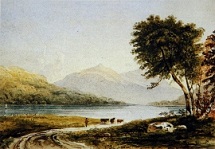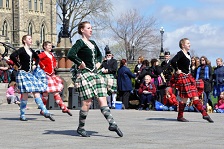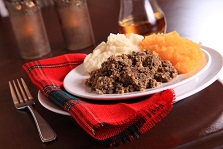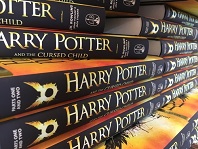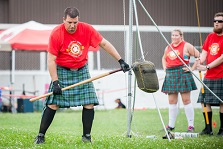Scottish Language 101
Scottish Language 101
While Scottish do speak English, some people might find that not everyone sounds the same in Scotland. Plus, there is also Scottish Gaelic, a language that slowly starts to gain more speakers again after it had been not spoken by many people. In this article, we will briefly introduce the main dialects of Scotland, a few examples of Scottish “specialties” in vocabulary, and also have a short look at Scottish Gaelic.
The four main region of Scottish dialects
In the bigger picture, there are four different main regions when it comes
to dialects, however, they are then also split into a variety of
sub-dialects. The four main regions are:
- Northern
- Central
- Southern
- Insular (i.e. the Scottish language from the various islands of Scotland)
Scots can often easily identify where in Scotland someone comes from. One example: If a woman uses the word “hen” to address other women, then it is quite likely that she is from the area around Glasgow. And no, they don't call men “roosters”. What a shame!
Scottish vocabulary
As any version of English, Scottish English has some words that are only found in Scotland – just like there are words that have a special meaning in the USA, or words that have one meaning in the USA and another meaning in England (e.g. chips!).
Some words you might come across when you are in Scotland are:
| Scottish English | “normal” English |
|---|---|
| Aboot | About |
| Agin | Against |
| Aglae | Awry |
| Athol Brose | Sweat Oatmeal dessert |
| Auld Reekie | Edinburgh (nickname) |
| Bahookie | Bum |
| Bannock | Scone |
| Ben | Mountain (e.g. Ben Nevis) |
| Blaeberry | Bilberry (NOT blueberry) |
| Blether | Chatter |
| Braw | Fine |
| Burn | Stream |
| Claymore | Traditional Scottish longsword |
| Crabbit | Ill-tempered |
| Dram | Small drink of whiskey |
| Dyke | Wall |
| Firth | Estuary (e.g. Firth of Forth) |
| Jings! | Gosh! |
| Galoot | Idiot |
| Glen | Valley |
| Hogmanay | New Year's Eve |
| Laddie | Boy |
| Lassie | Girl |
| Slàinte! (Gaelic) | Cheers! |
| Stookie | Useless person |
| Tattie | Potato |
| Wee | Small (e.g. wee lad – small boy) |
| Ye | You |
| Yer | Your |
And then there are whole sentences that you might hear in Scotland, but might only rarely see written down. They might be a little confusing, but to the Scottish it all makes sense. Here are some examples:
| Scottish English | “normal” English |
|---|---|
| Ach, away ye go! | I don't believe you! |
| I'm swithering whether to accept. | I am uncertain about whether I should accept. |
| What a dreich day! | What a miserable day (weather-wise)! |
| He's a right sweetie-wife. | He's quite good at gossiping. |
| It's a sair fecht. | It's a struggle. |
| Her face is tripping her. | She looks fed up. |
| Just play the daft laddie. | Feign ignorance. |
| You're standing there like a stookie. | You look as if you can't stir yourself (this is a reference to stucco sculptures). |
| Awa an bile yer heid! | Get lost! |
Scottish Gaelic
You need to be very keen and motivated if you would like to become anywhere close to fluent in Scottish Gaelic. It is not an easy language to learn, especially not if you try to only learn it from book. It is a language whose learning process would greatly benefit from learning it in a class or with a personal teacher.
In 2011, the Scottish census revealed that 1.1% of all Scottish can speak Gaelic, however, the numbers are rising, and if you happen to travel to an area where Scottish Gaelic is not that uncommon, they will be very happy if you can say one or the other thing in Gaelic. You will also notice that there are Gaelic programs on TV and on the radio.
One thing to notice is that the Scottish Gaelic alphabet only has 18 letters:
A, B, C, D, E, F, G, H, I, L, M, N, O, P, R, S, T, and U.
Here are some phrases to get you started – but beware, the pronunciation is really not what you might think in many cases, and the pronunciation is the part of the language that makes it so hard to learn.
| English | Scottish Gaelic |
|---|---|
| Welcome! | Fàilte! |
| What's your name? (formal version) | Dè an t-ainm a th'oirbh? |
| My name is... | Is mise... |
| Where are you from? (formal version) | Co às a sibh? |
| I am from... | Tha mi à ... |
| Hello | Halò |
| Good morning | Madainn mhath |
| Good afternoon (also good evening) | Feasgar math |
| Good night | Oidhche mhath |
| I don't understand. | Chan eil mi 'tuigsinn. |
| How do you say …. in Scottish Gaelic? | Dè Ghàidhlig a th'air ... ? |
| Sorry | Tha mi duilich! |
| Thank you! | Tapadh leibh |
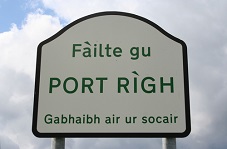

_(2).jpg)
